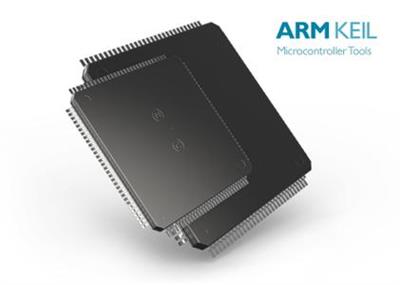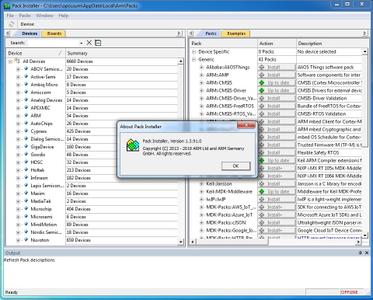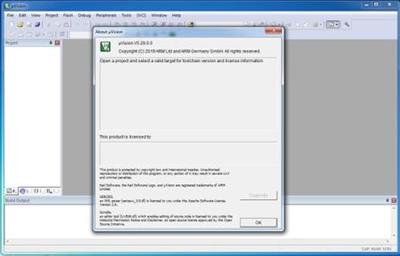
Keil MDK-ARM 5.29 (x86/x64) | 775 MB | | Language: English
The Keil development team is pleased to announce the availability of Keil MDK-ARM 5.29 is the complete software development environment for a wide range of Arm Cortex-M based microcontroller devices.
MDK includes the µVision IDE and debugger, Arm C/C++ compiler, and essential middleware components. It supports all silicon vendors with more than 7,000 devices and is easy to learn and use.
Vision updated to V5.29.0.0
– Added: option in License Manager to request a 30-day evaluation license of the MDK Professional edition.
– Added support for v8.1-M architecture extensions (requires MDK Professional).
– Enhanced: auto-generated scatter files can manage multiple modules with the same name.
– Enhanced: librarian is skipped in build if all contained objects are up to date shortening the build times.
[Arm Compiler included]
– Included Arm Compiler 5 version 5.06u6 – unchanged: see Release Notes for further details.
– Updated Arm Compiler 6 to version 6.13 – see Release Notes for further details.
[Software Packs included]
Keil – MDK Middleware 7.10.0
– Updated File System Component to version 6.13.0
. Added ftime_set and ftime_get functions used to manage the file or directory timestamps.
. Added status codes fsAlreadyExists and fsNotDirectory that allow more control when using fmkdir, frmdir and fchdir.
. Added debug configuration for debugging with Event Recorder.
. Added second instance of the RAM drive (drive R1).
. Corrected bug in FAT file name compare for names with equal root and 13 characters in length (LFN).
. Corrected bug in FAT cluster handling when deleting file which could cause false out of space error.
. Corrected bug in fmedia which could cause non-initialized pointer access when using uninitialized drive.
– Updated Network Component to version 7.12.0
. Added support for Digest access authentication in HTTP server.
. Added support for user accounts in HTTP server Digest authentication.
. Added support for passwords stored as MD5 hash value HA1.
. Added support for the WiFi interface.
. Added send frame buffering, if the MAC address in the IPv6 NDP cache is not resolved (the first call to the netUDP_Send function does not fail anymore).
. Corrected possible memory corruption in CHAP authentication, when PPP interface used in client mode, and the server generates CHAP challenges of less than 16 bytes.
. Corrected memory issue when receiving fragmented broadcast message.
. Corrected return code from BSD_EINVAL to BSD_ESOCK if BSD socket is not created.
. Corrected filtering for link-layer addressed UDP messages (datagrams with correct MAC address and invalid IP address are no longer received).
. Corrected Neighbor Discovery failure, when the requested global IPv6 address is on-link.
. Corrected problem in BSD socket timeouts, when the blocked receiving and blocked sending in the socket are simultaneously used from two threads.
. Corrected problem, that the device is not accessible to IPv6 after changing the MAC address.
. Corrected possible TCP socket retransmission failure in keep-alive mode for very short time limits, when the keep-alive timer expired before the retransmission timer.
. Corrected CHAP authentication failure in the PPP interface, when used in client mode.
. Improved and optimized network core processing.
. Improved versioning, added library version to a map file (i.e.: "network_ip4_release_v7.10.6").
. Improved access to ethernet, serial and modem drivers.
. Improved Event Recorder debug support and updated documentation for the debug events available in the Network Services.
. Optimized send_frame functions for network interfaces.
. Updated IGMP multicast address filtering.
. Updated lease renewal in the DHCP client also updates the default Gateway.
– Updated USB Component to version 6.13.7
. Added thread name for all threads created by the USB stack.
. USB Host
.. Corrected CMSIS-RTOS1 compatibility mode compilation error in USART_CDC_ACM.c and USART_PL2303.c templates.
.. Corrected USBH_Device_GetController, USBH_Device_GetPort, USBH_Device_GetAddress, USBH_Device_GetVID, and USBH_Device_GetPID functions to work in device enumeration Initialize callbacks.
. USB Device
.. Corrected delay on USB out transfer when multiple USB devices are used.
.. Corrected handling if endpoint configuration in driver fails.
.. Corrected MSC class support for sector size different than 512.
.. Corrected MAC_str_to_addr function in Ethernet RNDIS driver.
.. Corrected MAC_str_to_addr function in USBD_User_CDC_ACM_RNDIS_ETH.c and USBD_User_CDC_ACM_RNDIS_VETH.c templates.
.. Improved USB input buffers alignment (aligned to 32 bytes, support cache up to 32 bytes per cache line).
– Unchanged Graphics Component to version 5.50.
– Unchanged Board Support Interface specification.
ARM – CMSIS 5.6.0
– Updated: CMSIS-Core (Cortex-M) to version 5.3.0.
. Added provisions for compiler-independent C startup code.
. Corrected a compilation issue in cmsis_armclang_ltm.h introduced in 5.2.0.
– Updated: CMSIS-Core (Cortex-A) to version 1.1.4.
. Corrected an issue in the Floating Point Unit Function __FPU_Enable().
. Modified functions __get_SP_usr() / __set_SP_usr() to work with ArmClang.
. Corrected a zero argument handling in function __CLZ().
– Updated: CMSIS-DSP to version 1.7.0.
. Modified arm_math.h .
.. Removed dependance on cores.
.. Deprecated __SIMD32 and introduced new functions for SIMD accesses.
. Added compilation flags for FFT. It is now possible to include only the tables required for FFTs.
– Updated: CMSIS-NN to version 1.2.0.
. Added arm_status arm_depthwise_conv_u8_basic_ver1 function for depthwise convolution with asymmetric quantization.
. Added arm_nn_sat_doubling_high_mult and arm_nn_divide_by_power_of_two support functions for quantization.
– Updated: CMSIS-RTOS to version 4.82.
. Corrected: Recursive Mutex 16-bit lock counter is now checked to not overflow.
– Devices
. Generalized C startup code for all Cortex-M family devices.
. Updated Cortex-A memory regions and system configuration files.
– Utilities
. Updated SVDConv to version 3.3.27.
. Updated PackChk to version 1.3.87.
ARM – CMSIS-Driver 2.4.1
– Added CMSIS-WiFi driver for the Espressif ESP8266 WiFi module.
– Updated CMSIS-WiFi driver for the Inventek ISM43362 WiFi module to version 1.2.0.
. Corrected SocketClose functionality.
. Updated Initialization function to handle unavailable reset pin.
. Updated functionality to comply with CMSIS WiFi Driver Validation.
. Added debug of SPI traffic to Event Recorder.
. Corrected PHY_LAN8742A power down bit definition.
Keil – Arm Compiler 1.6.2 (Software Pack)
– Added ARMV81MML to the list of supported processors.
– Updated EventRecorder.scvd:
. using level ‘Detail’ for start/stop A event group to not show in red.
. adding prefix attribute to enable linking the event property to the doxygen documentation.
[Target debugging]
– ULINKpro:
. updated firmware to version 1.59 adding support for JTAG-DPv3 (ADIv6).
. added support for CoreSight DAP v3 based on ADIv6.
. added support for SDF files from CMSIS debug description for complex trace topologies.
. added support for switch out of dormant state for CoreSight SW-DPv2 (Serial Wire Debug Port).
– ULINKplus:
. added support for CoreSight DAP v3 based on ADIv6.
. added support for SDF files from CMSIS debug description for complex trace topologies.
. added support for switch out of dormant state for CoreSight SW-DPv2 (Serial Wire Debug Port).
– ULINK2:
. added support for SDF files from CMSIS debug description for complex trace topologies.
. added support for switch out of dormant state for CoreSight SW-DPv2 (Serial Wire Debug Port).
– CMSIS-DAP:
. added support for CoreSight DAP v3 based on ADIv6.
. added support for SDF files from CMSIS debug description for complex trace topologies.
. added support for switch out of dormant state for CoreSight SW-DPv2 (Serial Wire Debug Port).
– ST-LINK (STMicroelectronics):
. updated debug driver to version 3.0.7.0.
. including firmware upgrade utility ST-LinkUpgrade.exe version 2.5.2.
– NULink (Nuvoton) updated debug driver to version 3.01.6951.
– Stellaris ICDI support has been removed.
[Cortex-M Architecture models]
– Updated Fixed Virtual Platform (FVP) support to version 11.8.59.
MDK helps you to create embedded applications for ARM Cortex-M processor-based devices. MDK is a powerful, yet easy to learn and use development system. It consists of MDK-Core and software packs, which can be downloaded and installed based on the requirements of your application.
The MDK Tools include all the components that you need to create, build, and debug an embedded application for ARM based microcontroller devices. MDK-Core consists of the genuine Keil µVision IDE and debugger with leading support for Cortex-M processor-based microcontroller devices including the new ARMv8-M architecture. DS-MDK contains the Eclipse-based DS-5 IDE and debugger and offers multi-processor support for devices based on 32-bit Cortex-A processors or hybrid systems with 32-bit Cortex-A and Cortex-M processors. MDK includes two ARM C/C++ Compilers with assembler, linker, and highly optimize run-time libraries tailored for optimum code size and performance:
– ARM Compiler version 5 is the reference C/C++ compiler available with a TÜV certified qualification kit for safety applications, as well as long-term support and maintenance.
– ARM Compiler version 6 is based on the innovative LLVM technology and supports the latest C language standards including C++11 and C++14. It offers the smallest size and highest performance for Cortex-M targets.
Software packs contain device support, CMSIS libraries, middleware, board support, code templates, and example projects. They may be added any time to MDK-Core or DS-MDK, making new device support and middleware updates independent from the toolchain. The IDE manages the provided software components that are available for the application as building blocks.
The product selector, gives an overview of the features enabled in each edition:
– MDK-Lite is code size restricted to 32 KByte and intended for product evaluation, small projects, and the educational market.
– MDK-Essential supports Cortex-M processor-based microcontrollers up to Cortex-M7 and non-secure programming of Cortex-M23 and M33 targets.
– MDK-Plus adds middleware libraries for IPv4 networking, USB Device, File System, and Graphics. It supports ARM Cortex-M, selected ARM Cortex-R, ARM7, and ARM9 processor based microcontrollers. It also includes DS-MDK for programming heterogeneous devices.
– MDK-Professional contains all features of MDK-Plus. In addition, it supports IPv4/IPv6 dual-stack networking, IoT connectivity, and a USB Host stack. It also offers secure and non-secure programming of Cortex-M23 and M33 targets as well as multicore debugging of heterogeneous devices including the Linux kernel and Streamline performance analysis
You will learn how easy it is to get started with MDK Version 5 to efficiently develop embedded applications for microcontrollers based on ARM Cortex-M processors series.
Keil was founded in 1985 to market add-on products for the development tools provided by many of the silicon vendors. It soon became evident that there was a void in the marketplace that must be filled by quality software development tools. It was then that Keil implemented the first C compiler designed from the ground-up specifically for the 8051 microcontroller.
In October 2005, Keil (Keil Elektronik GmbH in Munich, Germany, and Keil Software, Inc. in Richardson, Texas) was acquired by ARM.
The Keil products from ARM include C/C++ compilers, debuggers, integrated development and simulation environments, RTOS and middleware libraries, and evaluation boards for ARM, Cortex-M, Cortex-R4, 8051, C166, and 251 processor families. Since the acquisition, ARM has continued the development and support of Keil products for existing 8051, 251, and C166 markets.
Product: Keil MDK-ARM
Version: 5.29
Supported Architectures: 32bit / 64bit
Website Home Page : http://www.keil.com
Language: english
System Requirements: PC *
Supported Operating Systems: *
Size: 775.5 mb
Minimum Hardware Requirements
– 1 GHz 32-bit or 64-bit processor
– 1 GB of system memory (RAM)
– 2 GB of available disk space
Recommended Hardware Requirements
– 2+ GHz 64-bit processor
– 4 GB of system memory (RAM)
– 5 GB of available disk space
– 2 Mpbs or higher Internet connection for software activation, product updates and online services like the PackInstaller
Supported Operating Systems
32-bit and 64-bit variants of Microsoft Windows are supported:
– Windows 10 Home
– Windows 10 Pro
– Windows 10 Enterprise
– Windows 10 Education
– Windows 8.1
– Windows 8.1 Pro
– Windows 8.1 Enterprise
– Windows 8
– Windows 8 Pro
– Windows 8 Enterprise
Software will be tested against the latest revision supplied by Microsoft. Beta Releases or Release Candidate versions of Windows are not recommended for productive use.
Note: Support for 32-bit Microsoft Windows has been deprecated in Q3/2018. Please make sure to switch to a 64-bit operating system.





